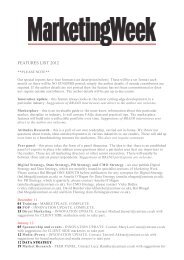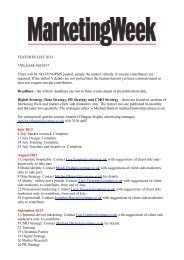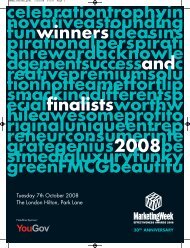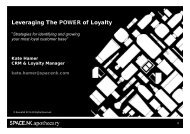Interactive Seven 2009 Supplement - Marketing Week
Interactive Seven 2009 Supplement - Marketing Week
Interactive Seven 2009 Supplement - Marketing Week
Create successful ePaper yourself
Turn your PDF publications into a flip-book with our unique Google optimized e-Paper software.
MWIB_260209_p019 19/2/09 17:25 Page 19<br />
INTERACTIVE AFFILIATE<br />
Searching for trends: Analysts<br />
predict that the next 12 months<br />
will see an increased focus around<br />
social media networks and search<br />
giant Google<br />
in 2007, and it is estimated that the number of ads broadcast during<br />
video content will increase by more than 70%, according to eMarketer<br />
– a website that keeps marketers up to date with trends and developments<br />
in online marketing and emerging media.<br />
Affiliate Window communications director David Hall says that,<br />
in <strong>2009</strong>, marketers will analyse costs very closely and choose the most<br />
effective “cost-against-return” strategy. “Affiliate marketing absolutely<br />
fits the bill because retailers pay commission to affiliates only after a<br />
sale is made,” he adds.<br />
Trends<br />
Industry insiders insist that affiliate marketing will grow rapidly this<br />
year because affiliates, marketers and consumers are all becoming<br />
more sophisticated. Indeed, the affiliate sector is already giving off<br />
positive signals, as larger European and US-based affiliate specialists,<br />
such as LinkShare, settle in the UK. “We could see increasingly sophisticated<br />
offerings and choices from retailers over the coming months.<br />
They will move from their previous focus which was on aggregation<br />
alone,” says Liane Dietrich, managing director of LinkShare.<br />
However, affiliate marketers are under pressure to develop clearer<br />
commercial policies. They are also expected to follow better use of<br />
commissions and more active policing of areas in which affiliate activities<br />
conflict with offline and other online channels. This is driven by<br />
the increased assimilation of affiliate marketing into the online mainstream<br />
as well as margin pressures on retailers.<br />
Sophistication being the key, Existem Affiliate Management managing<br />
director Mark Russell says there will be a shift towards a rationalisation<br />
of affiliate programmes. “As budgets and spending plunge,<br />
affiliates will need to create more scope for comparisons and provide<br />
reasons to choose one brand over the other,” he says.<br />
A renewed focus on customer service by affiliate marketers has<br />
also been noted. “Customer experience has always been an important<br />
factor in affiliate marketing, but there have never been any hard and<br />
fast rules to govern it,” says Dietrich. The recent IAB code of conduct<br />
“As budgets and<br />
spending plunge,<br />
affiliates will need<br />
to create more<br />
scope for<br />
comparisons and<br />
provide reasons to<br />
choose one brand<br />
over the other”<br />
Mark Russell, Existem<br />
Affilliate Management<br />
for vouchers illustrates how customer service and experience is now<br />
at the forefront of the affiliate industry.<br />
Another trend that analysts predict will be an increased focus<br />
around social media network and search giant Google. Hall at Affiliate<br />
Window says: “Every year, Google has done something that has<br />
changed the affiliate marketing model, from display URL restrictions<br />
to removing the bidding restrictions on trademarks. In <strong>2009</strong>, there<br />
could be another major shake-up, this time facilitated by Google Social<br />
Search.” According to the experts, such developments will enable the<br />
search engine to serve more accurate and effective advertising. For<br />
instance, incorporating user preferences within Google’s search algorithm<br />
will enable pay-per-click (PPC) affiliates to develop ad strategies<br />
that target very specific demographics.<br />
Merchants will also seek exposure on true content sites with a<br />
demonstrable audience. Traditionally,<br />
the affiliate model<br />
rewards the last referrer. However,<br />
consumers often look for<br />
products on a content site and<br />
then go through a voucher code<br />
or discount site for the best deal.<br />
Even then, only a voucher code<br />
affiliate earns the commission,<br />
despite other factors being<br />
involved in the consumer’s decision-making.<br />
Hall adds: “We could<br />
expect to see an evolution of the<br />
CPA model to a multiple attribution<br />
CPA system, whereby a number<br />
of affiliates earn commission<br />
from the sales generated.”<br />
While vouchers and discount<br />
codes are a positive trend, companies<br />
do not rely on them <br />
<strong>Marketing</strong> <strong>Week</strong> <strong>Interactive</strong> 19








